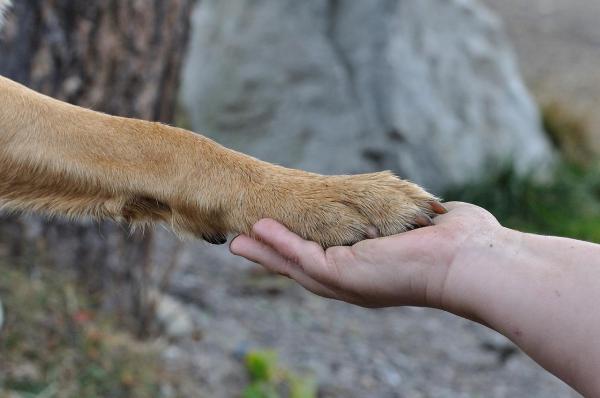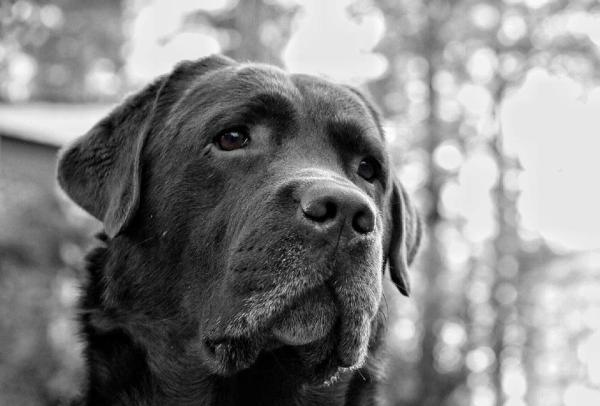
Can dogs predict death? This question has been asked by many experts in canine behavior, as many believe that dogs are able to identify the presence of cancer in human beings, among other diseases.
It is also believed that dogs can detect the presence of positive and negative forces in the environment that human beings can't feel - some even say that dogs can see spirits. It may be something supernatural, but there may also be a rational explanation. In this AnimalWised article, we'll speculate on this matter a bit further.
Can dogs smell death?
While humans rely on sight, dogs rely on smell; in fact, their brain is dominated by the olfactory cortex. Their sense of smell is superlative, and thanks to that dogs are able to accomplish great feats that human technology still has not managed to emulate.
In fact, a dog's sense of smell is about forty times better than ours. This allows them to detect changes in the composition of atmospheric air, which would mean that they can predict natural disasters or gas leaks before humans notice. Up to an extent, dogs can smell death.
Can dogs smell life?
We have all seen images of rescue dogs working in disaster sites as assistants to firemen and rescue teams. These dogs, trained to detect survivors among ruins caused by landslides, earthquakes, floods, wars and other catastrophes, react differently when detecting survivors or dead bodies.
When rescue dogs detect a living person buried in rubble, they signal the "hot spots" with insistence, after which fire fighters and rescue teams can start their rescue immediately. However, when they find corpses their behavior is much different; occasionally, they show signs of anxiety or fear.
In those instances, the buried victims, whether alive or dead, are not in sight. Therefore, the rescue dogs detect them by their smell. Dogs also have a keener sense of hearing than humans, being able to register slightly lower frequencies and much higher ones. They are also better at locating the exact source of the sound; if a buried person shouts, dogs will likely hear it.
If the victim can't speak up, though, how can dogs distinguish whether they are alive or dead? The most plausible conclusion is that there is a clearly distinct odor between life and death in a human body, even if the death is very recent. These are scents that trained dogs are able to differentiate.

Can dogs smell sickness?
The intermediate stage between life and death has a specific name: agony. Some agonies are noticeable, as the person about to die because of sickness or an injury is in clear pain. Anyone can predict their death within a certain time span, as the signs are obvious.
But some wasting diseases cause a different kind of painless agony, in which no imminent signs of death are appreciated, and where technology has not yet reached the accuracy of canine smell. It is not unreasonable to guess that if living bodies smell one way and dead bodies smell differently, there may be a third smell for bodies in the in between.
The case of Oscar, the therapy cat who has accurately predicted the death of about 50 people in the nursing home where he lives, is well known. In his case, scientists have argued that there is probably a chemical released by organisms about to expire that cats can smell.
Serious diseases, like cancer, affect the organs' very structure. It is not far-fetched to guess that dogs may pick up on that change, which humans cannot notice, and act differently around that person.
What are necromones?
It is known that some animals, like wolves, somehow announce their imminent end to their pack. Ethologists, specialists in animal behavior, argue that this may be a way to prevent contagion to the rest of the pack, signaling that it is better to stay away from the individual.
This behavior has also been observed among cockroaches and crustaceans. Why do wolves and cockroaches, which are really different species, show similar behaviors? Scientists offer an explanation: Necromones.
Pheromones are chemical secretions that members of the same species can detect and socially respond to. The best known example are sex pheromones, which signal that the animal is in heat. Necromones are a type of pheromone secreted by dying or dead bodies; it is likely that dogs can identify them in sick people who are approaching their end.
Necromones have been studied primarily among insects, such as cockroaches, ants or woodlice. In such insects it has been observed that the chemical composition of their necromones comes from their fatty acids, especially oleic acid and linoleic acid, which are the first to deteriorate at death. Scientists sprayed areas with these substances and noticed that the cockroaches avoided passing over them, as if they were a contaminated area.

Can dogs predict death?
By their keen sense of smell, the release of pheromones, and by their training, it could be argued that yes, some dogs can predict death. It may be that all dogs can pick up the scent of disease or death, but that not all of them can recognize it. It may be that dogs can only detect dead bodies when specifically trained to do so, and that it is not a natural instinct.
Whatever the reason, dogs do have feelings and create relationships. This is why it is not so surprising that some dogs and cats have been known to watch over their carers' final hours. They may not understand the situation fully, but they can sense it.
Do you have any experience to share on whether dogs can predict death? Tell us in the comments section!

If you want to read similar articles to Can Dogs Predict Death?, we recommend you visit our Facts about the animal kingdom category.